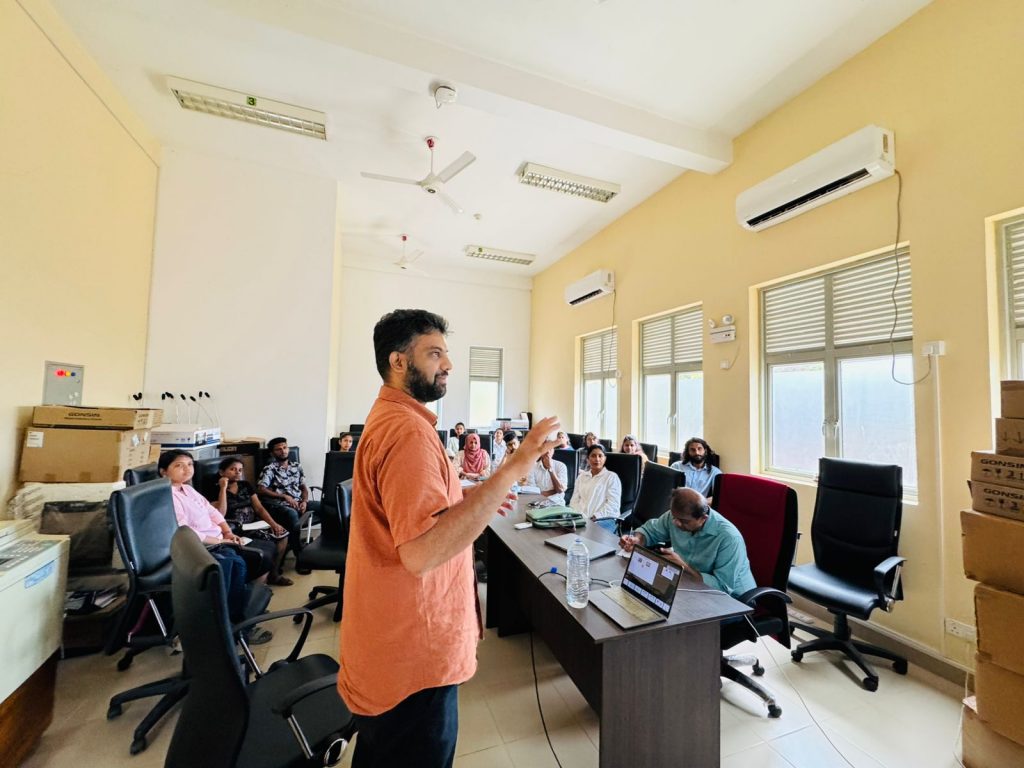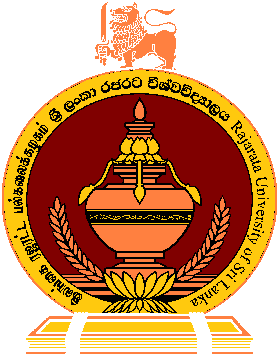Role of Protein Disaggregation in Cell Repair
Dr. Nadinath Nillegoda Shares His Experiences on Advancing Protein Damage Repair and Biotech Potential
On October 3, 2024, at 9:30 AM, a workshop was held in the Department of Bioprocess Technology boardroom at the Faculty of Technology, Rajarata University of Sri Lanka. The event brought together fourth-year undergraduate research students, research assistants, academic staff, demonstrators from the department, and students from the Faculty of Applied Sciences, fostering an engaging environment to explore advancements in bioprocess technology and cellular repair.

The workshop featured Dr. Nadinath Nillegoda, a distinguished researcher and past Group Leader at the Australian Regenerative Medicine Institute. Dr. Nillegoda holds a bachelor’s degree from Ohio Wesleyan University and a Ph.D. in Pharmacology and Systems Therapeutics from the Mount Sinai School of Medicine at New York University. His pioneering research focuses on cellular repair mechanisms after protein damage, offering promising implications for future therapeutic applications. His expertise encompasses biochemistry, molecular and cell biology, protein quality control pathways, protein folding, aggregation, and degradation.
This workshop provided valuable insights and knowledge, highlighting the importance of collaboration and innovation in the field of cellular proteostasis. The workshop aimed to provide attendees with in-depth knowledge on crucial topics while serving as a motivational platform for career advancement in research. The session featured a presentation showcasing findings from two significant research studies.
The first study focused on protein disaggregation in metazoan cells, vital for maintaining protein quality control during stress and aging. Although metazoans lack the HSP100 disaggregase found in non-metazoans, the research identified that cooperation between classes A and B J-domain protein co-chaperones significantly enhances the disaggregation activity of the human and nematode HSP70 systems through forming intermolecular complexes that scaffolds the assembly of the disaggregases. This disaggregase configuration efficiently solubilize heat-induced amorphous aggregates, in vitro. Dr. Nillegoda also discussed some of the recent findings pertaining to how these protein disaggregases are regulated in human cells recovering from proteotoxic stress.
The second study investigated the disaggregation of amyloid fibrils associated with neurodegenerative diseases, particularly focusing on α-synuclein in Parkinson’s disease. This research demonstrated that the human HSP70 chaperone, in collaboration with co-chaperones DNAJB1 and HSP110, can effectively dissolve preformed α-synuclein fibrils. Utilizing biochemical methods and nuclear magnetic resonance spectroscopy, the researchers discovered that DNAJB1 recognizes unstructured regions in α-synuclein and directs HSP70 to the fibrils. The synergistic action of DNAJB1 and HSP110 enhances disaggregation by promoting the clustering of HSP70 at the fibril surface, generating forces that facilitate disassembly. This cooperation plays an active role in remodeling amyloid aggregates, offering critical insights that could inform future therapeutic strategies for neurodegenerative diseases. Overall, the workshop offered essential insights into the mechanisms of protein disaggregation, underscoring the critical role of collaboration and innovation in driving progress within this important area of research.
During the workshop, attendees engaged with the expert about his career progression, inquiring about the challenges he faced and how he navigated them. He provided valuable advice on achieving success in an academic career while emphasizing the importance of maintaining a healthy work-life balance. He highlighted that out-of-the-box thinking, hard work, and patience are crucial for success in research. He also shared strategies for coping with the various challenges that arise in a research environment, emphasizing the importance of networking and maintaining good relationships with advisors and colleagues.
The session proved to be highly informative, with the expert’s down-to-earth approach and willingness to share his experiences resonating with the audience. His insights not only inspired students but also sparked thoughtful discussions on protein damage repair and its potential applications in biomedical research and biotechnology. Overall, the workshop fostered a supportive environment for aspiring researchers, emphasizing the significance of resilience and collaboration in academia.


